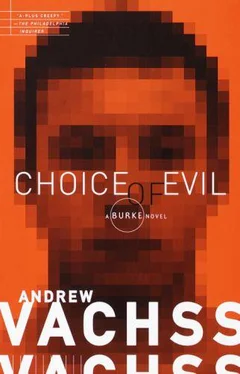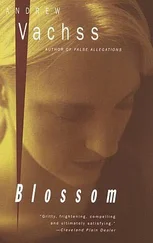“I don’t understand,” she said.
“Let us assume you have a natural talent for. . . oh, I don’t know, say painting, all right? Now, you would be quite good at it as soon as you picked up a brush. That is, you would have a natural. . . aptitude for it. But the more you practiced, the better you would become.”
“I have a natural talent,” the child piped up.
“And what is that?” I asked her.
“I can draw.”
“Can you?” I asked, simply to engage the child. Her work on the checkerboard pieces rendered her declaration quite superfluous.
“Yes, I can. I don’t mean trace, or color either. Not like a baby. I can draw.”
“What do you draw?” I asked her, drawing her (pun intended) further away from the potentially frightening aspects of her situation.
“I can draw anything,” she said with the smug confidence of the very young.
This disturbed me. I pride myself on being fully equipped, studying the child I capture well in advance to be prepared for any eventuality. For example, I once took a child who was diabetic. It was greatly reassuring to inform the parents on my very first call that I was aware of the problem and our “nurse” was on hand with all appropriate medications. Improvisation is not my forte, and leaving the hideout to obtain materials was out of the question. Still, I asked the child: “What do you need to draw?”
She looked at me questioningly, but said nothing. Clearly, she required a further explanation.
“What. . . materials?” I asked. “Paper, pencils. . . what sort of implements do you require?”
“Oh!” she said brightly. “I have everything. Right in my backpack.”
A momentary flash of paranoia—that is, paranoia in the classic psychiatric sense, not the functional hyper-vigilance which is the trademark of a successful practitioner of my profession—overcame me for an instant, but then I told her she was free to get what she needed.
“I can’t reach it,” she said.
And I saw she was speaking the truth. Her restraints permitted significant freedom of movement, but I had placed the backpack in a far corner of the basement, and it was, in fact, beyond her grasp. I walked over and picked it up. Professional experience commanded that I search it thoroughly. . . but the finely honed instincts—which are, obviously, not “instincts” at all, being not bio-genetic but actually the synthesis of sufficient experiences so that they surface as quickly as if encoded—developed over those same years caused me to hand it to the child without examination.
She took it from me as though she expected nothing less. Some captives are querulous and demanding. Others are abject and fearful. Some are floridly terrified, others virtually mute. This one fit no such definition. She was. . . at peace. Not with the resignation that comes over an individual when all hope is gone, but with the sense that the future, while immutable, was acceptable.
“Is everything there, Angelique?” I asked.
“My name isn’t Angelique,” she replied, not looking inside the backpack.
“Angel, then,” I offered.
“My name is Zoë,” she said in a voice that brooked no disagreement.
I avoided the usual adult trap of condescension and merely said, “My apologies, Zoë. Now. . . is everything there?”
“You didn’t open it,” she replied.
“I. . . don’t understand.”
“You didn’t open it,” she repeated. “From the time I got on the bus, I was the only one who had it. It’s always been with me.”
“And so. . .?”
“So if you didn’t open it, whatever was there is still there, see?”
“Yes. That was a very good deduction. You’d make a good detective,” I told her, mentally chastising myself for overlooking the obvious—if I were interested in protecting a child from kidnapping, I would certainly have affixed a tracking device in some way, and a backpack would be quite suitable. I would not make such a mistake again.
“I would?” she asked, checking my face carefully.
“You certainly would,” I assured her, my voice brisk and professional. “A good detective works only with the facts. Anything that is not a fact should be ignored.”
“There’ll be detectives, won’t there? Looking for me, I mean.”
“Certainly. They have probably already begun.”
“But they won’t find me, will they?”
“No, child, they won’t.”
“Because you’re smarter than them, right?”
“I am. . . . It is not strictly a matter of intelligence,” I explained. “It is more a matter of careful planning and skillful execution. There is no accounting for random chance, but—”
“So they *could* find me?” she interrupted.
“It is possible. Nothing is one hundred percent certain in these matters. There is always *some* chance.”
“Oh,” is all she said.
“Don’t you want to draw?” I asked her.
“I always want to draw.”
“Then why not. . .?”
“I don’t want you to be mad,” she said, her voice tentative.
“Why would I be angry?” I asked her, hoping to teach by example the difference between insanity and annoyance—people are so imprecise in their verbiage, but only children seem capable of learning.
“Because I want to draw you,” she said, her eyes wide and alert.
A conundrum was thus produced. The child’s intelligence was manifest, a phenomenon not to be ignored. Therefore, despite my desire to make her stay with me as pleasant and stress-free as possible under the circumstances, surely she realized that a sketch of her own kidnapper would be of great value to the authorities. On the other hand, she certainly had ample opportunity to use her eyes, if not her skill at drawing, and my features were, presumably, memorized. If I refused her request, it might supplement the illusion that she was, eventually, to be returned. Conversely, it would perhaps distress her. On balance, I elected to compromise.
“You may certainly draw me, if you wish,” I told her. “But under the circumstances I’m sure you will understand you’ll have to leave the. . . artwork here when you leave.”
“It was for you anyway,” she said. “I never keep what I draw.”
I pondered this internally. Children are generally guileless, but that is a rule to which there are many exceptions. . . some characterological, but most situational. Children are extraordinarily self-absorbed—a characteristic often retained into adulthood. But that sort of analysis did not figure in my assessment—globalization is not a valid problem-solving tool. Why would the child never keep her own handiwork? Under other circumstances, I would have simply asked the apparently invited question. But the child’s mien was that of someone who did not expect to be questioned, so I merely said:
“Very well. How would you like me to. . . pose?”
“You don’t have to do anything,” she assured me. “I can just draw while we. . . talk or something, okay?”
“All right.”
She opened her backpack and removed a thick drawing tablet and several pencils.
“I have pastel sticks too,” she said, noticing my observations. “But I don’t draw people with them. Not until I’m done with the pencils.”
“Very sensible,” I told her. “Pencils are more precise, aren’t they?”
“They’re sharper,” she replied, as though amplifying her agreement.
She busied herself at the tablet. I watched her work, dark hair spilling over her face, almost obscuring it from view. I glanced at the tablet and noticed that a good many pages had been removed. Apparently it was true that the child did not keep her work once it was completed. I. . .
“How long does it usually take?” Her voice intruded into my thoughts, startling me. Even without glancing at my watch, I realized some considerable time had passed.
Читать дальше











